Tidbits - Nov. 7, 2019 - Reader Comments: Impeachment Cover-up; Trump Changing Judiciary; McConnell Countdown; Warren's Medicare for All Plan; California Fires; Army Recruitment Answer to Student Debt; Middle East - Trump Policy Collapse; and more

Re: Trump Is Committing 'Felony Bribery' by Giving Fundraising Cash to GOP Senators Ahead of Impeachment Trial: Ex-Bush Ethics Lawyer (Jeff Bast; Meredith Lee Schafer-Garza; Jenny Kastner; Aramis Martínez)
Re: The White House’s Godfather Fantasy (Mike Liston; Catherine P. Mulder)
Re: McConnell Brags He and Trump Are 'Changing the Federal Courts Forever' With Extreme Right-Wing Judges (Rick Rice; Van Monk; Norm Littlejohn)
Election?? - I Will Not Accept the Results -- cartoon by Lalo Alcaraz
Re: Elizabeth Warren's Medicare for All Plan (Adam Gaffney (M.D., M.P.H., President, Physicians for a National Health Program); Daniel Millstone; Tom Caves; Cher Lunn)
Medicare for All -- cartoon by Mike Stanfill
Re: The California Fires: It’s Private Enterprise That Can’t Get Things Right (Karen Saunders; Suzanne Crowell; Daniel Millstone)
Re: Army Recruitment Now Based on Student Debt (Robert Politzer; CM Pravda; Eglė Malinauskaitė)
Re: The New Middle East That's Coming (Robert Supansic)
Re: California Opens the Public Banking Floodgates (Bill Resnick)
Re: Global Left Midweek - The New October (Ethan Young)
Re: Fire and Fury in the Chilean "Oasis" (Rosemary A. Barbera)
Re: Obama Officials Confess Their Human Rights Sins at J Street Conference (Susan Vago Webb)
The J Street Conference (Susan Vago Webb)
Re: Hypersonic Weapons and National (In)security: Why Arms Races Never End (Roberto Colon Ocasio)
Re: Israel Destroyed Record Number of Palestinian Homes in Jerusalem in 2019 (Stan Nadel)
Re: Deep Sleep Gives Your Brain a Deep Clean (Bonnie Hughes)
Re: Naomi Oreskes: ‘Discrediting Science Is a Political Strategy’ (Rusty Rebar)
Resources:
Capital & Main Launches Yearlong Series On The 2020 Election And Inequality
This Infographic Shows How Only 10 Companies Own All The World’s Food Brands (The Hearty Soul)
Announcements:
Celebration of the Life of Leon Wofsy - Berkeley - November 10
Nancy Hood- I’ve Got A Song: A Living History of the McCarthy Era - New York - November 13 (Tamiment Library)
Going Big: Expanding Labor Rights for the 21st Century - New York - November 15 (CUNY School of Labor and Urban Studies)
March for our Lungs Victory Lap and Next Steps - Ridgefield, NJ - November 16 (Food & Water Watch - New Jersey)
Greensboro Massacre: 40 Years Later - Lessons for Movement Building (Discussion) - Washington, D.C. - November 20 (Bread & Roses and A.C.T.O.R.)
Trump doesn't understand or believe in democracy. This is why he cozy's up with dictators and presidents for life. Laws, rules and morals are beneath him or so he believes.
Jeff Bast
=====
Maybe it's a bribe or maybe it's how the system was built to operate
Meredith Lee Schafer-Garza
Posted on Portside's Facebook page
=====
Of course he is. An impeachment inquiry functions just like a grand jury, and he is bribing the jurors. If it goes to trial, he is again bribing the jurors. An impeachable offense on its face.
Jenny Kastner
Posted on Portside's Facebook page
=====
He knows the price of conscience of his GOP companions.
Aramis Martínez
Posted on Portside's Facebook page
Re: The White House’s Godfather Fantasy
We need to look at a few things about Trump: First, he obviously never expected to be elected and once he was, wow! What a great chance to pick up some bucks such as cheap banks loans, more guests at his hotels and so on, but what stands out to me is that every he opens his big fat stupid mouth it moves the stock and bond market in significant directions is up, down or sideways. Who's watching this and why hasn't' t this come up as a serious and maybe the most serious reason as to why Trump and his family members, friends and associates (some of whom are known to be part of organized crime) are not up for trial? As for myself, I know why, I'm just asking the rest of you,
Mike Liston
=====
an insult to Marlon, may he RIP
Catherine P. Mulder
Posted on Portside's Facebook page
"The Trump-McConnell attempt to take over our judiciary has been an astonishing attack on civil rights," the Leadership Conference on Civil and Human Rights tweeted in response to McConnell's comments. "But remember: Every single nomination counts. If we stop one anti-civil rights judge, thousands of people could be treated more fairly—for decades." In an interview with MSNBC's Chris Hayes Monday night, Sen. Jeff Merkley (D-Ore.) agreed that Trump and McConnell are "reshaping the judiciary. ...They're doing it for the rich and powerful," Merkley said. "This is the exact evisceration of the 'We the People' vision of our Constitution. That's what Mitch McConnell is doing, that's what Trump is doing. It's not for ordinary Americans, it's for the rich and powerful, and we have to find a way to stop them. And that's going to be the elections next year."
Rick Rice
Posted on Portside's Facebook page
=====
Just like the Nazis
Van Monk
Posted on Portside's Facebook page
=====
Forever is a long time, Mitch. Enjoy your last year in the US Senate.
Norm Littlejohn
Posted on Portside's Facebook page
Election?? - I Will Not Accept the Results -- cartoon by Lalo Alcaraz

Lalo Alcaraz
(cartoon from 2016, after the third presidential debate)
Re: Elizabeth Warren's Medicare for All Plan
November 2, 2019
Dear single-payer supporter,
On Friday, Sen. Elizabeth Warren released a detailed plan for financing a single-payer Medicare for All health care system. In terms of overall system costs, Sen. Warren’s plan represents a reasonable but likely conservative estimate of the savings possible from a single-payer system over a decade. In addition to the savings Warren identifies, single payer could generate even larger administrative savings by implementing global budgets to fund hospitals (as in Canada), rather than adopting Medicare’s overly complex hospital payment mechanism.
On the financing side, Sen. Warren's proposal would combine public funds that currently pay for two-thirds of all health expenditures with new and reinstated taxes on corporations and the very wealthy, along with a mechanism for continued employer contributions to the health system. You can read the full details of her plan HERE.
PNHP welcomes Sen. Warren’s plan as yet another path towards financing a universal and just health system, along with Sen. Bernie Sanders’ menu of financing options that accompanied his single-payer bill in the Senate and the proposed package of taxes included in Prof. Robert Pollin’s 2018 economic analysis of Medicare for All. Together, these plans demonstrate that financing Medicare for All is not a question of if, but a question of how and when.
To those who defend today’s broken health system I ask, “How do you propose we pay for it?” For millions of under-insured Americans facing serious illness, their financing options far too often involve draining their life savings, selling their homes, launching GoFundMe campaigns, or simply going without needed health care -- and hoping for the best.
Sen. Warren’s proposal is a powerful reminder that in the richest nation on Earth, the money for Medicare for All is already there — we’re just not spending it on health care.
Adam Gaffney, M.D., M.P.H.
President
Physicians for a National Health Program
29 E Madison Street; Ste 1412 | Chicago, Illinois 60602
312-782-6006 | info@pnhp.org
=====
More about Elizabeth Warren's plan for Medicare For All from David Dayen. Thanks to Portside for the link. Of course the specifics of enacting such a plan would be the subject of intense bargaining so no blueprint here is more than a demonstration that the plan is possible. David writes in part:
"The whole thing is kind of a ridiculous political exercise, a burden placed upon single-payer advocates that other health care reform plans never have to shoulder. Warren perhaps hopes that she can drill down to such detail to take the issue off the table politically, and challenge other campaigns to step up with similar substance.
But in doing so, Warren’s team incorporates a number of other policy preferences outside of health care, including comprehensive immigration reform, banking regulation, initiatives to fight inequality, antitrust enforcement, boosts to unionization, tax compliance, anti-corruption measures, military spending, and more. It really reflects an entire agenda and value set that values working families over the oligarchs currently running roughshod over America."
Daniel Millstone
Posted on Portside's Facebook page
=====
Here’s what Warren’s healthcare plan does NOT promise:
• To eliminate premiums
• To eliminate copays
• To eliminate private insurance
• To be a “singled payer” system
Tell me again how this is Medicare for all.
Tom Caves
Posted on Portside's Facebook page
=====
Tom Caves: A quick, simplified breakdown of universal healthcare. EVERYONE is covered, from cradle to grave. In Canada, through our taxes, the average family pays about $3600 per YEAR. No co pays or deductibles or caps.
If you want extra benefits, semi room, private room, dental, extra physiotherapy, you can purchase from an insurance company for about 150 to 300 per month. There are usually deductibles of 20 percent on these insurance plans, but no withholding. You do not prepay anything. If it costs $100 you pay $20. At source. They do not make you forward pay for deductible fees. But there may be caps on the private insurance.
So for universal healthcare, deducted from pay as a tax, and added extra insurance, at say, $200 per month, your total healthcare for the YEAR would be around $6000. No caps and any doctor. All our doctors are under our universal health system as are all our hospitals. Is that not less cost and more coverage?
Also, remember, you only pay insurance companies for EXTRA coverage. We have never used it ourselves. The only losers are the insurance companies. You do not lose anything in coverage, except the unreasonably high insurance costs per month in the US. And our wait times aren't any longer than those in the US. Main difference is being able to go to a doctor BEFORE things get out of hand. We really push preventative health care.
Cher Lunn
Posted on Portside's Facebook page
Medicare for All -- cartoon by Mike Stanfill
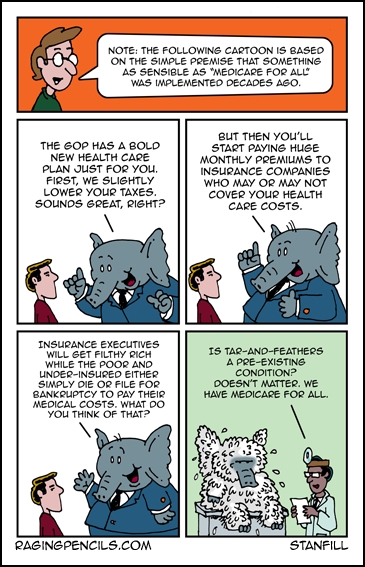
Mike Stanfill
November 4, 2019
Raging Pencils
Re: The California Fires: It’s Private Enterprise That Can’t Get Things Right
“Critics of public sector inefficiencies have long declared that “government should be run like a business.”
A business such as, say, Pacific Gas & Electric?
The current wildfire crisis in California should serve as an object lesson in the folly of expecting private enterprise to operate in the service of the public interest.”
Karen Saunders
Posted on Portside's Facebook page
=====
They could have been forced to by state regulators. Broken system.
Suzanne Crowell
Posted on Portside's Facebook page
=====
In some crises are opportunities. Here, via NYC Democratic Socialists of America, https://www.facebook.com/nycdsa/ are indications that the time for public power may have come. Investor-owned utilities have not planned for climate change and have paid dividends and executive bonuses even while starving basic maintenance. Pacific Gas & Electric is a poster child for public power. Can California take it without saddling itself with the terrible liabilities PG&E have created?
Rep. Ro Khanna Of California Backs Public Takeover Of PG&E: ‘For-Profit Does Not Work’
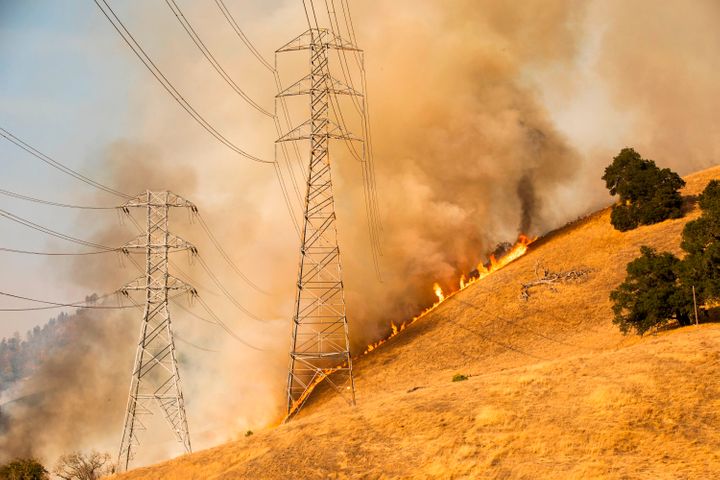
Daniel Millstone
Posted on Portside's Facebook page
Re: Army Recruitment Now Based on Student Debt
Who needs a Draft when millions of young, desperate undereducated men are available to fight our wars?
Robert Politzer
Posted on Portside's Facebook page
=====
Lol that’s funny, because the Secretary of Education DeVos is in charge of Dolling our $129billion in Financial Aid ($11k/student to 11.5m)
and at the same time her brother (CEO of Blackwater/Academi) takes in billion$ for private mercenary army subcontracting.... like $400m during Hurricane Katrina or all Middle East wars ....ummmm ???
see: Erik Prince entry in Wikipedia
CM Pravda
Posted on Portside's Facebook page
=====
The Army has always relied on the structurally-manufactured economic anxieties of people to get new recruits.
"The head of Army Recruiting Command, stated that discussion of the endless wars and potential outcomes “was not really part of the discussion” recruiters are having with high schoolers. Recruiters' new niche: the national student debt crisis."
Eglė Malinauskaitė
Posted on Portside's Facebook page
Re: The New Middle East That's Coming
When Trump announced during the 2016 campaign that he would be his own Secretary of state, the hair on my neck stood up. The last President to successfully do that was Franklin Roosevelt. Roosevelt, for example, not only read "Mein Kampf" while many other leaders ignored it, he read it in the original German and did so critically. He inserted a note into his copy of the first English translation noting, accurately, that the translation was not to be trusted. Imagining Trump doing something similar is stuff for the late night comics.
Hallinan's piece not only describes the disintegration of Trump's Middle East policy but makes obvious his complete inability to either understand it or to respond to it.
Robert Supansic
Re: California Opens the Public Banking Floodgates
Yes, it's a real step forward, very important and i have done several interviews. But CA's legislation that i believe limited the creation of 7 banks legitimates it and movements in other states have a better chance of success.
And as to CA, the local public banks might well fund Community Energy.
I wonder how much capital they can accumulate and from where.
Bill Resnick
Re: Global Left Midweek - The New October
I have been moderating Global Left Midweek for more than a year now, but this week's is special. It gives us a real sense of the period we find ourselves in. The 20th century Communists called their time an era of imperialist war and revolution. We are still in an era of war, but not of a nature that is so cut and dried. What we are seeing now is not revolution, but we are inching towards a revolutionary situation: the rulers are finding it harder to rule, and the populace is motivated to consider trying to take over. We should be watching every social explosion, every election, every fight over democracy - because they're all fights over democracy. No authoritarian solution can save the planet without class-interested mass political action.
Ethan Young
Posted on Portside's Facebook page
Re: Fire and Fury in the Chilean "Oasis"
"In Chile, contrary to how things appear, there is a tense and delicate balance that keeps various public policies in effect. They are sustained through the belief in an entrenched bureaucracy and a strong dose of inertia. When this fails, repression is the last recourse left to preserve institutions."
Rosemary A. Barbera
Posted on Portside's Facebook page
Re: Obama Officials Confess Their Human Rights Sins at J Street Conference
I attended this conference. This article is such a cynical distortion and disservice to a very positive development. - the conference was filled with outstanding panels and speakers, yes including some from the Obama administration. That is to be hailed, not whined about. Yes things have changed and what may not have been possible during the Obama administration is more possible now as things have unfolded in Israel and the U.S. I have no use for Mondoweiss in general - narrow leftism.
Susan Vago Webb
Posted on Portside's Facebook page
A few thoughts on the J Street conference in DC, Oct. 26-29, which I just got back from ( feel free to share as you see fit).
1. From some of the panels and plenary speakers, I perceive a deep evolving shift in how Israel as a state is defined, among Israeli Arabs and Israeli Jews. Israeli Arabs are now claiming their right to participate in Israeli politics and society. This is a tremendously significant, dramatic development. And Israeli Jewish progressives/moderates/activists are seeing the necessity (not to mention the justice and morality) of working in coalition/alliance/partnership with Israeli Arabs, and advocating for civil rights and social and economic and political equality. The fact whose recognition is emerging is that Israel is a multi-ethnic country (Israeli Arabs are 20 percent of the population; then there are Bedouins and some other small groups. And of course the Jewish population is increasingly non-European in origin with significant immigration from Ethiopia and other places “of color.”)
The concept of a “Jewish democratic state” - one of J Street’s main slogans - is a progressive slogan in the current context of the fight against the ultra-right in Israel. But privately I see it as an oxymoron: ultimately I think Israel, and American Jews, will have to grapple with the fact of its multi-ethnic character and the major fact that one-fifth of its people are Arabs (Muslim and Christian). And in fact the J Street conference panels and speakers, which included Israeli Arab Joint List leader Ayman Odeh, reflected an evolving awareness of this. I mentioned this to one of the young activist leader panelists who is a close colleague of my friend Uri Weltmann whom you may recall I interviewed several years ago. This guy agreed with my take.
2. A major theme and thread throughout the conference was the essentialness (is that a word?) of defeating Trump in 2020. I was quite impressed with this.
A number of panels and speakers dealt with the issue of the upsurge in anti-Semitism, with the conference marking one year since the assault on the synagogue in Pittsburgh. In every case, this anti-Semitism including the Pittsburgh attack was linked to the rise of white nationalism/white supremacy, racism and anti-immigrant hate and the need for unity to combat these. I was frankly surprised, pleasantly, and impressed by this.
3. This conference raised, for the first time, what they emphasize is the “start of a conversation” on conditioning U.S. funding for Israel on how the money is used and that it not be used to support annexation, settlement expansion. The five presidential candidates who appeared in person were asked about this. This was widely reported on, in NY Times, WaPo and others. It’s pretty significant because in the past any talk questioning the $3.8 billion a year funding was a no-no in Jewish circles.
Of the five, only Amy Klobuchar did not want to say anything about anything Israel-Palestine related, saying it was not the place to discuss negotiating points. Of course Bernie was the most outspoken and passionate - and the audience loved him - who wouldn’t? He’s such a character, like everyone’s favorite somewhat quirky Jewish uncle from Brooklyn. Buttigieg talked about using the aid as a pressure tool - he was quite sophisticated and well spoken, in my opinion. Castro talked about it as a possibility; Bennet, who sounded to me like a college boy, was a little vague but did not reject the idea. A few other candidates sent video messages that were not shown there but can be viewed online: Biden, Warren, Beto, Yang and Williamson (!). I watched Warren’s - she hit all the right points but a little formulaic.
4. A side note on another topic:
During the lobbying day on Tuesday, people went to meet with our reps and senators. My congresswoman, Rosa DeLauro, informally chatted with our Connecticut group before our formal meeting with her staffer. She mentioned that she had just been talking with Jan Schakowsky (D-Ill., my old congressional rep), said something to the effect that “if you don’t support ‘Medicare for All’ you’re a pariah,” and that she/they preferred to talk about “Medicare for America.” Couple that with Sherrod Brown’s comments on this topic - you get the picture. These are some of the most progressive people in Congress.
Forgot to include: It was announced that there were 4,000 attendees, including 1,200 students, who participate through JStreetU.
I went to a JStreetU session - enormous room was packed and highly enthusiastic. Campuses all over the country. Among the speakers was a hopping, rocking Randi Weingarten. She also spoke at other parts of the conference - what a dynamo!
Susan Vago Webb
Re: Hypersonic Weapons and National (In)security: Why Arms Races Never End
In a country with no universal health care, no free higher education...taxpayer's money is used to build weapons that will be obsolete before they are used in any defensive action. Monumental waste!!!
Roberto Colon Ocasio
Posted on Portside's Facebook page
Re: Israel Destroyed Record Number of Palestinian Homes in Jerusalem in 2019
This contains the false claim that Palestinian residents of eastern Jerusalem were given permanent resident status while Jews get full citizenship. The reality is that the Palestinians were given the option of choosing either citizenship or permanent residency and it was their choice if they didn’t get citizenship. Most chose permanent residency because they didn’t want to be seen as accepting Israeli sovereignty — something that would mark them as traitors in the eyes of militants who threatened to kill traitors. And they still have the option of changing their status and becoming Israeli citizens, an option that increasing numbers of them have been exercising lately. The author of this article most likely knows this and is simply being disingenuous— or more bluntly dishonest.
Stan Nadel
Re: Deep Sleep Gives Your Brain a Deep Clean
You don’t mention dreaming - I have dreams most nights and they are usually interesting - not disturbing.
Bonnie Hughes
Re: Naomi Oreskes: ‘Discrediting Science Is a Political Strategy’
science suffers from the same fetishes as religion with the added hazard that its discoveries are bought & paid for by capital (faith in god makes people docile -- faith in science turns them into better shoppers)...
Rusty Rebar
Posted on Portside's Facebook page
Capital & Main Launches Yearlong Series On The 2020 Election And Inequality
Today – exactly one year before the 2020 presidential election – Capital & Main is launching a 12-month series on economic inequality in America. “United States of Inequality: 2020 and the Great Divide” will examine how tens of millions of Americans increasingly struggle to make ends meet, and how this reality will affect one of the most consequential elections in America’s history.
Conceived by Capital & Main and produced in partnership with the Guardian US, Fast Company and The American Prospect, “United States of Inequality” will feature at least one story or multimedia feature every week for 52 weeks through the November 2020 election.
Here’s what former Labor Secretary Robert Reich, who narrated this video on the series, has said about the project: “It’s so important for fact-based news outlets to shine a light on the defining issue of our time. ‘United States of Inequality’ is a timely reporting project.”
The series content will fall into the following five thematic areas:
- The State of Inequality in America: Reporting, analysis, infographics and videos about economic inequality in the U.S. leading up to the 2020 election.
- The Primary and Economic Inequality: Analysis of the voting records of leading presidential candidates on issues related to economic inequality, including wages, labor law, taxes and corporate power.
- Economic Inequality in Battleground States: On-the-ground reporting on how economic inequality is experienced by different ages, income groups and ethnicities, with an emphasis on key voting blocs in primary and general election battleground states.
- Economic Inequality in Trump’s America: Analysis and reporting on how the Trump administration’s policies are exacerbating economic inequality.
- What the Presidential Candidates Are Not Talking About: Coverage of economic policy proposals that have not been raised by presidential candidates but arguably should be part of the national conversation.
We hope you will follow “United States of Inequality” in the weeks and months to come as the nation grapples with an issue that will shape the 2020 election in profound ways -- and that ranks as the other inconvenient truth of our era.
- Sign up for updates on “United States of Inequality”
- Share “United States of Inequality” on Twitter
- Follow “United States of Inequality” on Twitter
Capital & Main - United States of Inequality Series
This Infographic Shows How Only 10 Companies Own All The World’s Food Brands
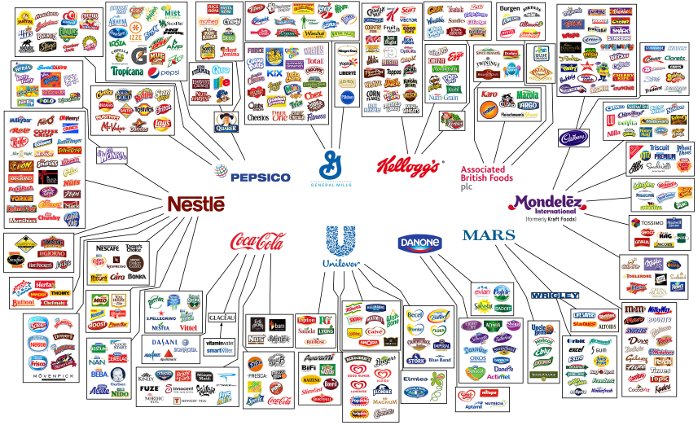
We all want to add diversity to our meals. This means searching the shelves for new products, extending our grocery lists, and trying the newest food products. We do this to boost our health, as well as ensuring we aren’t buying all of our groceries from one or two companies.
However, Oxfam International have put together a comprehensive infographic that illustrates just how little diversity there is in supermarkets. Despite the hundreds and hundreds of different brand names we see, just ten conglomerates produce the vast majority of the food we eat. So much for diversity…
The infographic shows that Mondelez, Coca-Cola, Nestlé, PepsiCo, Associated British Foods, Mars, Danone, General Mills, Kellogg’s, and Unilever, own nearly every processed item that is readily available to buy. Whether you indulge in sweet treats, fizzy drinks, potato chips, or even just a good cup of tea, you’re almost certainly buying from these big companies.
Some of the brands that are owned by these multinationals are surprising. For example, PG tips are owned by Unilever and Pepsico is the business behind Quaker Oats. It’s a worrying sign when we don’t know who is making our food.
The reason that they hide their name behind other brand names is so that consumers don’t realize that they have a monopoly on the market. They can hide their corporate greed, which ensures that they can infiltrate more markets and crush competition from independently owned small businesses.
The biggest downside for people like you and me is that manufacturing so much food leads to overly processed and chemical-laden products. The use of preservatives, mixed with the lack of consumer-led accountability, means that the ‘Big 10’, on average, just aren’t making food that is condusive to good health. It’s a terrifying wake-up call considering their combined market share, but do not despair as there are simple steps you can take to avoid them.
How to avoid the Big 10

The release of the infographic by Oxfam International is the first step to avoiding these faceless corporations. Take the time to study the image and make the conscious decision to avoid the brands on the list.
Although the list is comprehensive, there is no guarantee that Oxfam have successfully identified every ‘Big 10’ item in the grocery store. Bare this in mind when you are shopping and read up on the food you are buying. You should always know exactly where your food is coming from and who is responsible for producing it.
Finally, the best solution is the advice that I always give when it comes to ensuring that you are eating ethically and healthily. Where possible avoid branded foods, and even chain grocery stores. Buy your food from local independent stores and farmer’s markets. If we all did so we could stop the growing influence of the ‘Big 10’ which would force them to change their bad practices.
As Oxfam’s report states: ‘The world’s largest food and beverage companies have a lot of power – but you have more. And because they’re not using theirs enough to help poor communities or the planet, you can use yours to change the way they do business.’
Never forget, and never stop believing, that you can make a real difference.
Celebration of the Life of Leon Wofsy - Berkeley - November 10
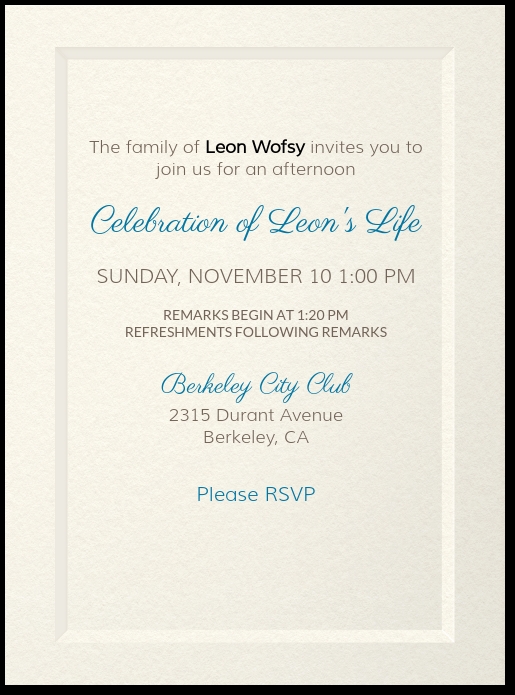
Nancy Hood- I’ve Got A Song: A Living History of the McCarthy Era - New York - November 13

|
I’VE GOT A SONG: A LIVING HISTORY OF THE MCCARTHY ERA – a program of stories and songs Written and performed by Nancy Hood with narration and musical accompaniment by Barry Brown, “I’ve Got A Song!” depicts Nancy’s childhood experiences growing up in a leftist family during the McCarthy Era. Complementing the stories is a musical selection ranging from spirituals to union songs, haunting love ballads to humorous tunes of social significance. A backdrop of family photographs and newspaper clippings completes this living history lesson that spans the mid-’40s through the early ’60s. Evoking laughter and tears, this program draws the audience into a child’s courageous struggle with adversity and persecution. |
Wednesday November 13 at 4:30 PM.
Tamiment/NYU Special Collections
Elmer Holmes Bobst Library
70 Washington Square South
Room 251
New York, NY 10012
Reflecting on “I’ve Got a Song”, Pete Seeger wrote: “I am lucky that the seeds I planted in 1949 are still thriving. Keep on…” Historian, Howard Zinn, endorsed the program stating: “Nancy’s performance piece is a delightful reminder of the connection between songs and social justice. I found it a pleasure to listen to and truly inspiring in recalling the historic struggles for a better world.” Following a recent performance at the Weaver Library, librarian Joyce May wrote: “Nancy Hood and Barry Brown present an important piece of American history that is rarely discussed. In using their exceptional musical talent to tell the story, they have created a fascinating, sobering, moving and entertaining program.” For more information or bookings: https://ivegotasong.wordpress.com
A reception with wine and cheese will follow the event. This event is sponsored by the Frederic Ewen Center.
RSVP: Please RSVP via the NYU events calendar.
Going Big: Expanding Labor Rights for the 21st Century - New York - November 15
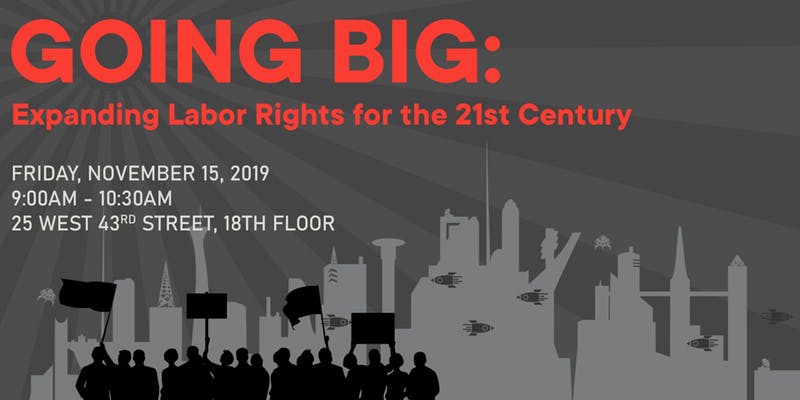
Going Big: Expanding Labor Rights for the 21st Century
Featured speakers include:
Randi Weingarten -- President of the American Federation of Teachers (AFT);
Steven Greenhouse -- Veteran New York Times labor journalist and author of the new book, Beaten Down, Worked Up: The Past, Present, and Future of American Labor.
Vincent Alvarez -- President of the NYC Central Labor Council
Friday, November 15 -- 9:00 AM – 10:30 AM EST
CUNY School of Labor and Urban Studies
25 West 43rd Street
18th Floor
New York, NY 10036
Doors open at 8:30am. A light breakfast will be served.
Although union density is near an all-time low, labor activism has surged in many sectors. From adjunct faculty to video game developers, digital media workers, platform app drivers, and public school teachers, labor movement activism is growing in a number of key sectors. This is happening as many full-time jobs with benefits are disappearing, consumer/student debt is skyrocketing, the “gig economy” is expanding, and economic insecurity is increasing for American workers and families. Housing and child care costs – which heavily impact workers’ income, wealth, and health – have also become more burdensome for many families. Under President Trump, a number of worker rights and protections have been weakened or denied, including:
• No movement toward federal minimum wage increase
• Weak overtime protections for salaried workers
• Allowing employers to self-report wage violations and escape penalties
• Siding with employers against rights of gay and transgender workers
• (Mis)classifying Uber drivers and others as independent contractors, denying them basic rights
• Continuing ‘Right-to-Work’ efforts kickstarted by Supreme Court’s Janus decision
• Restricting workers’ right to organize at franchised businesses like McDonald’s
• De-funding and weakening OSHA
What should be Democrats’ top policy priorities to strengthen workers’ rights? What are the most significant gaps and weaknesses in protections for worker organizing and economic rights today? ‘Right-to-work’ laws? Legal constraints against strikes and other worker actions? A federal minimum wage that has remained unchanged for a decade? The growing numbers of workers who fall outside the protections of the NLRA? The lack of livable safety net benefits for displaced and underemployed workers? The lack of protections for flex/gig workers? What new policies would best promote stronger worker protections and greater economic justice?
FIRST COME, FIRST SEATED
Events are free and open to all, but due to space constraints registration is requested. We generally overbook to ensure a full house. Registered guests are given priority check-in 15 to 30 minutes before start time. After the event starts all registered seats are released regardless of registration, so we recommend that you arrive early. Light refreshments will be served.
March for our Lungs Victory Lap and Next Steps - Ridgefield, NJ - November 16
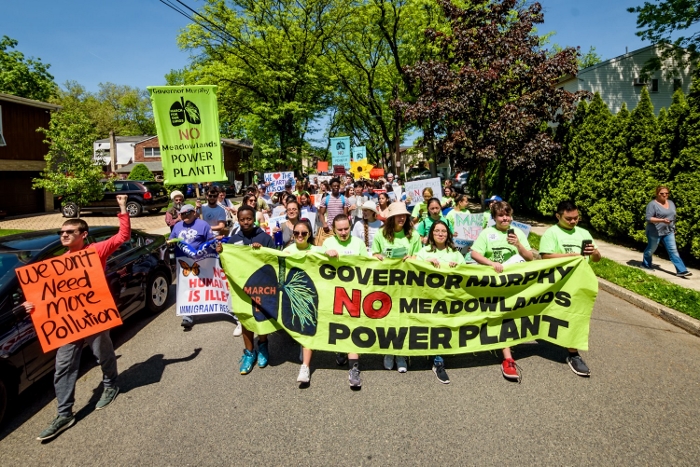
Hosted by Food & Water Watch - New Jersey
Saturday, November 16, 2019 at 4 PM – 6 PM
Ridgefield Community Center
725 Slocum Ave, Ridgefield, New Jersey 07657
4:00-4:20 Meet at Ridgefield Memorial High School
(555 Walnut St, Ridgefield, NJ)
4:20-4:30 Victory Lap March (0.5mi) to Community Center
4:30-6:00 Party and Plan Next Steps at Ridgefield Community Center (725 Slocum Ave, Ridgefield, NJ)
Come celebrate EVERYONE’S hard work in winning Governor Murphy’s opposition to the Meadowlands Power Plant. This victory has shown that we are powerful when we come together so let’s plan our next steps to stop on all new power plants, pipelines and climate-destroying fossil fuel projects in NJ (like the NJ Transit Fracked Gas Power Plant in the Kearny Meadowlands)!
Please email cworthington@fwwatch.org if you can volunteer to bring snacks or help set-up/clean-up!
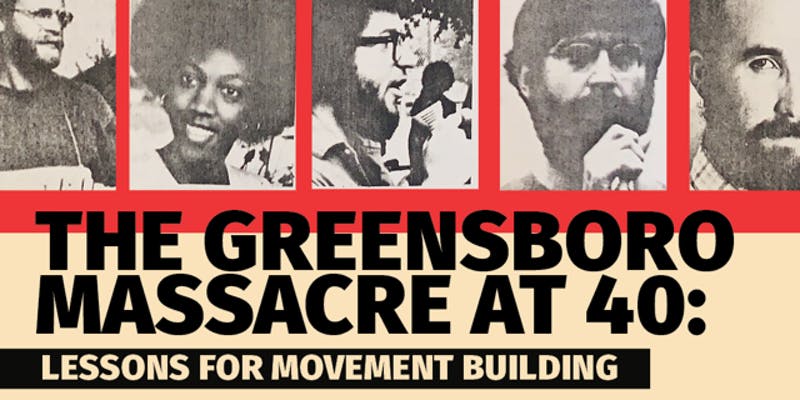
Wednesday, November 20, 2019 -- 6:00 PM – 8:00 PM
Busboys and Poets (Takoma)
235 Carroll Street Northwest
Washington, DC 20012
Jointly sponsored by Bread & Roses and ACTOR
Panel discussion with Rev. Nelson Johnson and Joyce Hobson Johnson (both survivors of the massacre) and retired Attorney Lewis Pitts who represented the widows and survivors of the Massacre in their successful civil suit against the KKK, the Nazis, and the City of Greensboro. The panel will be preceeded by a 23 minute documentary/retrospective film about the attack.
On November 3 1979, five young labor and community activists were gunned down in broad daylight in Greensboro, North Carolina by KKK and neo-Nazis, aided by local police and federal agents. The killers were acquitted twice by all-white juries. In a third civil trial, the role of the government was finally proven and acknowledged.
Who were these five extraordinary people and why were they murdered? How did it happen? Who are their survivors and what has their continued work for social change and search for justice yielded since November 3, 1979?
What lessons from the Greensboro massacre are relevant for activists today?
Please attend our commemoration of their lives which will include a brief film and panel discussion.
